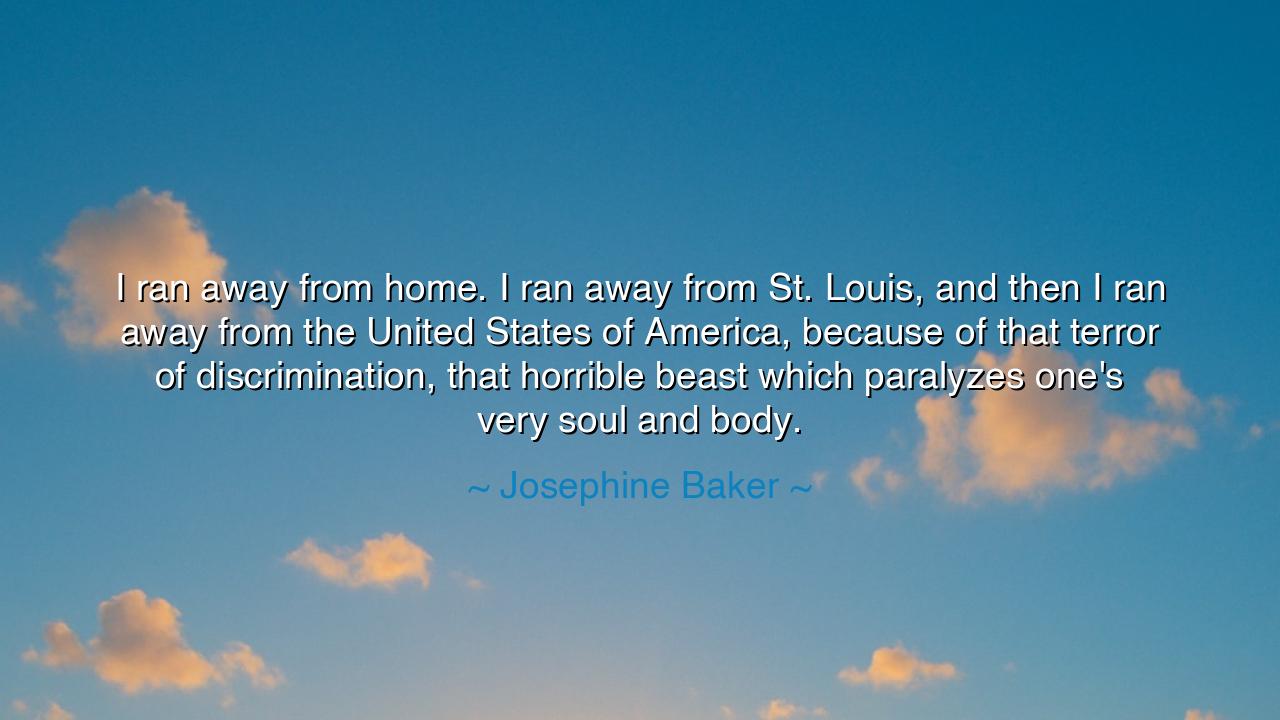
I ran away from home. I ran away from St. Louis, and then I ran
I ran away from home. I ran away from St. Louis, and then I ran away from the United States of America, because of that terror of discrimination, that horrible beast which paralyzes one's very soul and body.






In the words of Josephine Baker, spoken from the depths of both sorrow and strength, we hear the cry of a soul torn between love for her homeland and the agony it inflicted upon her: “I ran away from home. I ran away from St. Louis, and then I ran away from the United States of America, because of that terror of discrimination, that horrible beast which paralyzes one’s very soul and body.” These are not the words of mere flight — they are the lament of a spirit seeking freedom, the confession of one who could not live chained by hatred, and the testimony of a woman who dared to cross the sea in pursuit of her own humanity. Her voice, trembling yet fierce, is a psalm for every heart that has known exile not of distance, but of injustice.
Born in St. Louis, Missouri, at a time when the color of one’s skin determined the measure of one’s worth, Josephine Baker grew up in a land that called itself free but enslaved its own children in spirit. She fled first from poverty and hunger, and then from the deeper hunger for dignity that her homeland refused to feed. The “beast of discrimination”, as she named it, was not a creature of imagination but a living force — one that crept into every door and shadow, whispering to the oppressed that they were less than human. To survive, she fled. But in fleeing, she did not abandon her people; rather, she became their messenger to the world — a reminder that freedom must sometimes be sought beyond the borders of its false prophets.
When she arrived in Paris, the city of lights and art, she found what her own nation had denied her: respect. There, upon the stages of the Folies Bergère, she danced not as a servant or a shadow, but as a star. Her laughter, her movement, her defiance became symbols of what it means to reclaim one’s self from oppression. And yet, even in her glory, the memory of America’s cruelty followed her like a ghost. For to escape one’s homeland is not to escape its wounds. The terror of discrimination had sought to paralyze her body and spirit — but she transformed that paralysis into motion, that silence into song. Her art became her resistance, her life a living sermon on the power of self-liberation.
There is something profoundly ancient in her journey. Like Moses, she fled a land of bondage, crossing the waters toward a promised freedom. Yet, unlike Moses, she did not wait for divine instruction — she became her own deliverer. In her exile, she turned her suffering into strength. During the Second World War, she risked her life as a spy for the French Resistance, carrying coded messages hidden in her sheet music. The very country that had once broken her spirit gave her purpose anew, and she, in gratitude, defended it against tyranny. Thus the woman who had run from America’s injustice became a warrior for liberty itself — proving that freedom once tasted must be shared with all humanity.
Her story reminds us that exile can be both a wound and a weapon. For some, to flee is to surrender; but for the wise, to flee is to survive — to preserve the sacred flame of the self until the world grows ready to see its light. Josephine’s escape was not cowardice but courage, not retreat but rebirth. She fled not from weakness, but from a desire to live without hate. Her name stands beside those of countless others who, across time, have fled their nations only to find their purpose abroad — James Baldwin, Langston Hughes, Frederick Douglass, and even the ancient Hebrews, whose long journey through the wilderness became the very foundation of faith.
And yet, the truest triumph of her life was not in her fame, but in her return. Years later, she came back to America — not as the broken girl who had fled, but as Josephine Baker, a legend, a warrior, and a mother to twelve adopted children of different races and nations, whom she called her “Rainbow Tribe.” In this act, she offered her final answer to discrimination: love without boundaries, unity without prejudice. The woman who had once been paralyzed by hate now stood as a prophet of human brotherhood, living proof that the spirit cannot be confined by the color of its skin or the soil of its birth.
The lesson of her words, then, is eternal: when the world seeks to break your spirit, do not remain where your soul cannot breathe. Flee if you must — but flee toward truth, toward dignity, toward the horizon where you may stand unshackled. Let no nation, no law, no prejudice define your worth. Like Josephine, turn your pain into purpose, and your exile into song.
For in the end, Josephine Baker’s flight was not an escape — it was an ascension. From St. Louis to Paris, from silence to song, from rejection to reverence, she showed that the soul of a human being, once awakened, will cross oceans to find its rightful sky. And may every listener remember her words when faced with the beasts of their own time: that no oppression, however monstrous, can paralyze the heart that has chosen to live freely, bravely, and fully awake.






AAdministratorAdministrator
Welcome, honored guests. Please leave a comment, we will respond soon